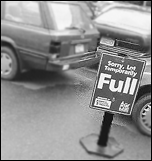![]()
![]()
![]()
![]()
![]()
![]()
Do Campus Parking
Woes Damage Scholarship?
Academic Senate
Subcommittee Hopes to See More Spaces, Lower Fees
By D. Lyn Hunter,
Public Affairs
Posted June 9, 1999
|
|
|
Abrams and his colleagues have witnessed a growing number of faculty staying away from campus due to insufficient and costly parking. He worries this exodus may damage scholarship at the university.
"The campus works best when a great many people gather here to exchange information and ideas, enriching the intellectual discourse," said Abrams. "If access to campus is obstructed, it will eventually impair the academic mission."
With the loss of 1,100 parking spaces in recent years -- due to campus construction, landscaping projects and the demolition of unsafe parking facilities -- Abrams, who is also chair-elect of the Academic Senate's subcommittee on parking and transportation, fears the problem will escalate.
Nad Permaul, director of parking and transportation, is sensitive to the potential damage to scholarship and is working to bolster the amount of parking on campus. Seven hundred new parking spaces will be constructed over the next six years -- 500 at Underhill (College Avenue and Channing Way) and 200 at the Oxford Tract (at Hearst Street).
But faculty, staff and student parking permit fees will skyrocket 84 percent over the next six years to fund the construction of these new spaces.
Abrams and the subcommittee say they have a better idea: instead of raising permit fees to pay for new parking spaces, use some of the $1.45 million generated annually from campus parking citations.
Legal constraints, however, prevent the use of citation money for building parking, said Permaul. State law requires that any money generated by parking citations, above normal operating costs, be used to subsidize the campus shuttle bus service.
A recent report issued by the subcommittee, quoting estimates by the parking and transportation office, states that only "a small, single-digit percentage" of faculty and staff use the campus shuttle service.
Many employees need to drive to campus, said Abrams, because Bay Area public transportation is slow and inadequate. For people who need to travel to and from campus in a timely fashion, especially those with elder and/or child care responsibilities, mass transit is not feasible, he said.
"My daughter, who works on campus, lives only 10 minutes away by car, but it takes an hour to get here by bus," said Abrams. "When she has to pick up her daughter from daycare, using public transportation is not an option."
Abrams and members of the faculty subcommittee are not against subsidizing alternate methods of transportation, but would like to see a more equitable distribution of funds to transportation and parking based on usage.
To accomplish this, the state law that prevents citation money from being used for new parking needs to be changed. The academic senate's divisional council has reviewed the subcommittee's request and forwarded it to Chancellor Berdahl. Subcommittee members hope the Chancellor will petition the Office of the President to make this a "legislative issue."
Horace Mitchell, vice chancellor -- business and administrative service, said some parking relief is on the horizon. A change in campus policy ensures that any parking lost due to new capital construction will be replaced, and the cost will be borne by the campus, not by faculty and staff through parking permit fee increases.
Permaul added that a number of parking spaces may be freed up as early as fall semester when students begin to use the universal class pass, which, for $18 a year, gives them unlimited access to AC Transit bus lines and the campus shuttle buses.
![]()
![]()
June 9 - July 13,
1999 (Volume 27, Number 35)
Copyright 1999, The Regents of the University of
California.
Produced and maintained by the Office
of Public Affairs
at UC
Berkeley.
Comments? E-mail berkeleyan@pa.urel.berkeley.edu.
